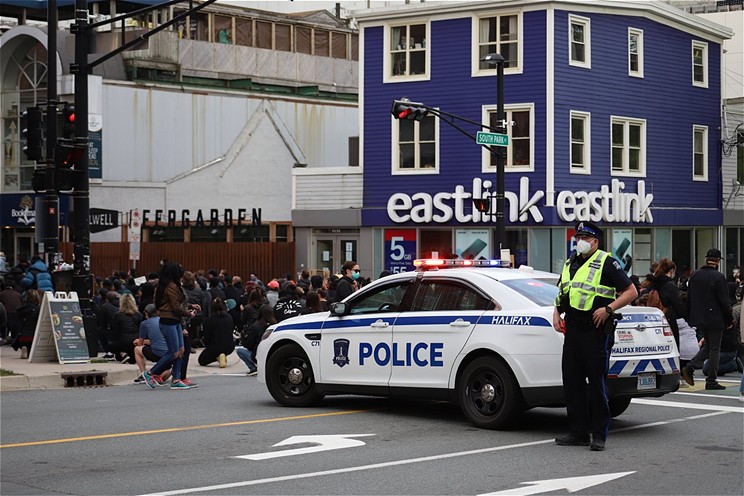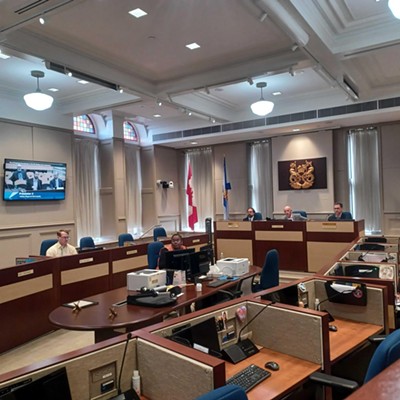On Dec. 22, 2022, The Coast published a very deep dive into the role police play in society. That is, the role they are expected to play vs. the role they actually play in comparison to how much we, the taxpayers, are paying for policing services. One of the things The Coast tried to find out while preparing that story was how good the police are at their main job: Catching criminals.
What we tried to determine was this: When a police investigation leads to an arrest, how frequently does that alleged criminal end up convicted of the crime in court? The Coast asked the province for the court statistics for break and enter, theft from a motor vehicle, theft of over $5,000, fraud, homicide and sexual assault for June to December of both 2021 and 2022.
The Coast asked for those specific stats because the HRP provided its arrest stats for those periods to its oversight body, the Board of Police Commissioners, in February 2022. The provincial Department of Justice initially believed that limiting the scope to those arrests would allow it to compile the associated data more easily to give to The Coast.
However optimistic the department was, it quickly hit a wall of software compatibility. The DoJ is set up to track who should be in court, when and for what; it is not set up to give metadata on the information it has. To put it into bureaucratic jargon, the province is not set up to measure key performance indicators of the police. To put that in English, no one has any idea if the police are any good at their jobs.
That includes the Board of Police Commissioners, the city committee whose entire reason for existing is to make sure the police are doing their jobs. The BOPC doesn't know, and worse, it doesn't seem interested in finding out, which is an issue we'll come back to shortly. But first, a little more about data collection.
The Department of Justice passed The Coast on to the Public Prosecution Service—its Crown Attorneys prosecute criminal cases—in hopes that a different government body would have the information in a format we could use. It did not. However, this can partly be explained by the fact that when a crime goes from the police to the court system, everything changes drastically. How the court part of the legal system works is quite complex and is likely worth its own explainer, so one will be forthcoming in the following weeks. The short version: What the police think they can prove and what the courts require them to prove are very different standards. And the police’s job (catching bad guys) is different than the Crown’s job (finding out what’s true and determining whether a trial is in the public interest). Sometimes when charges come from the police to the Crown everything is fine, and the case goes ahead. But sometimes the charges are downgraded to what can be proved beyond a reasonable doubt—and sometimes the Crown just doesn't take the case.
The issues with the Board of Police commissioners tracking police performance can be traced back to the bread aisle. There are cops in Superstores in the HRM because Galen Weston Jr. doesn’t want hungry people surviving by eating his profits. So he’s hired cops to patrol some Superstores, which the Halifax Regional Police has a policy allowing. If someone goes through the self-checkout and a cop notices that person didn’t scan some items, that police officer can then arrest and charge that person for theft. If the Crown finds the person stole a $5 item out of desperation driven by hunger or if the person missed some things because they’re vision impaired, the Crown may decide it’s not worth it to prosecute.
But even if the Crown drops the case, the police may have already issued a press release naming the person. Police may have also put the charges on someone’s criminal record, which are supposed to be removed when the charges are dropped. The police don’t always do that, even though that’s a violation of the Criminal Records Act. Both of these can forever haunt people as they try and move on with their lives. Even though the Board of Police Commissioners can’t verify that cops in Superstores are doing any good, and knows that interactions with police often do more harm than good, the board allows the HRP to continue having a policy that allows cops to work private gigs that are likely clogging up the court system because the board historically has been pathetically woeful at the “civilian governance” and “oversight” parts of its job. That is to say, the Board of Police Commissioners has historically not justified its stated reasons for existing.
The complacency of the Board of Police Commissioners must be challenged; it is putting us at risk. In the Police Act, one of the well-defined responsibilities of the board is to make the police chief present a budget, and ensure the police budget does the following:
(a) determine, in consultation with the chief officer, priorities, objectives and goals respecting police services in the community;
(b) ensure the chief officer establishes programs and strategies to implement the priorities, objectives and goals respecting police services;
(c) ensure that community needs and values are reflected in policing priorities, objectives, goals, programs and strategies;
(d) ensure that police services are delivered in a manner consistent with community values, needs and expectations;
(e) act as a conduit between the community and the police service providers;
(f) recommend policies, administrative and organizational direction for the effective management of the police department;
(g) review with the chief officer information provided by the chief officer respecting complaints and internal discipline;
(h) ensure a strategic plan and business plan is in place; and
(i) ensure the department is managed by the chief officer according to best practices and operates effectively and efficiently.
Has the Board of Police Commissioners ever done even a fraction of this with a police budget? Is allowing the HRP to violate our Charter rights through the use of polygraphs the sign of a “department managed by the chief officer according to best practices?” Is a budget with polygraphs that are used to violate charter rights a budget that "ensures" the "community values are reflected in policing priorities?"
Since it’s unlikely the board members will do their jobs without outside influence, it is vital that if you are able, you show up to the BOPC meeting happening this Wednesday, Jan. 11, at 12:30pm at City Hall and demand the board go through HRP chief Dan Kinsella’s budget with a fine-tooth comb. Demand that they “ensure that community needs and values are reflected in policing priorities, objectives, goals, programs and strategies” in the budget. It requires going line by line through the budget and evaluating if every single red cent of taxes the police get is actually best spent on police instead of something else.
It will be onerous, and it will take time, but it is the price of having proper oversight of our police force. And the only reason it will be so hard to do is that proper oversight of the police is not something Halifax has ever done before.
Closing the accountability gap will take time and energy from us, the citizens of Halifax, because our elected officials have apathetically demonstrated, time and again, that they don’t care about us unless we make them.














